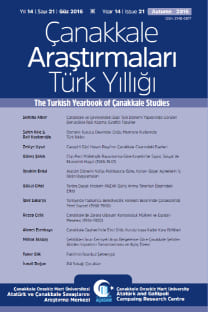Remembering Rupert Brooke and Siegfried Sassoon in Gelibolu Novels
Öz
Gelibolu Campaign (1915) is an inspiration for fiction writers as they delve into the ancient and present history of the campaign in their fictional constructions. Although in different ways the novels pay tribute to the memories and heroes of the campaign while connecting the carnage of 1915 to the classical times, of Homer’s Troy. References to Iliad and Odyssey appear in fictional stories representing Gelibolu battlefield as a mythical land. T.S. Eliot’s anti-war poem The Wasteland (1922) is echoed in novels lamenting the loss. Besides classical examples British war poets Rupert Brooke and Siegfried Sassoon are also remembered in fictional representations of the campaign. Yet, the representations offer an alternative discourse sought by New Historicism replacing the romantic and heroic representations of war with bitter and traumatic ones. This study aims to analyse the tributes to Brooke and Sassoon in Stanton Hope’s Richer Dust (1925), Bruce Scates’s On Dangerous Ground (2012), Rachel Billington’s Glory (2015), and Peter Yeldham’s Barbed Wire and Roses (2007) as they try to unearth the voices of First World War poets and discuss new perspectives offered by novelists in their understanding of the poets. Although wars consume poets besides the intellectual and educated mass, the power of poetry is still heard and remembered thanks to fictional representations creating a dialogue between voices of past and present.
Anahtar Kelimeler:
Gallipoli/Gelibolu, 1915, fiction, Rupert Brooke, Siegfried Sassoon, New Historicism, commemoration
___
References BILLINGTON, Rachel. (2015). Glory: A Story of Gallipoli, London: Orion Books. BERGONZI, Bernard. (1965). Heroes’ Twilight: A Study of the Literature of the Great War, London: Macmillan. BRISTOW, Joseph. (2014). ‘’Rupert Brooke’s Poetic Deaths’’, ELH 81 (2): 663-692. BROOKE, Rupert. (1915). 1914 and Other Poems, London: Sidgwick and Jackson. CAMPBELL, James. (2005). ‘’Interpreting the War.’’The Cambridge Companion to the Literature of the First World War. (ed. Vincent Sherry), Cambridge: Cambridge UP, 261-279. ÇELİKEL, Mehmet Ali. (2017). ‘’A Lyrical War: Gallipoli War through Poetry in Anzac Diaries’’, Journal of Narrative and Language Studies, 5 (9): 10-18. FUSSERL, Paul. (1975). The Great War and Modern Memory, New York: Oxford UP. GALLAGHER Catherine and GREENBLATT Stephen. (2000). Practicing New Historicism, Chicago and London: University of Chicago Press. GREENBLATT, S. (2010). Cultural Mobility: An Introduction. In GREENBLATT, S. ed. Cultural Mobility: A Manifesto, Cambridge: Cambridge UP. GILLIS, Stacy. (2007). ‘’Many Sisters to Many Brothers: The Women Poets of the First World War.’’ The Oxford Handbook of British and Irish War Poetry. (ed. Tim Kendall), Oxford: Oxford UP. 100-113. HOPE, Stanton. (1925). Richer Dust: A Story of Gallipoli. London: Jarrolds Publishers. LEE, John. (2007). ‘’Shakespeare and the Great War.’’ The Oxford Handbook of British and Irish War Poetry. (ed. Tim Kendall), Oxford: Oxford UP. 134-152. SCATES, Bruce. (2012). On the Dangerous Ground, Western Australia: UWAP. WINTER, Jay. (2006). Remembering War: The Great War Between Memory and History in Twentieth Century, New Haven and London: Yale UP. WHITE, H. (1978) Tropics of Discourse: Essays in Cultural Criticism, Baltimore and London John Hopkins UP. YELDHAM, Peter. (2007). Barbed Wire and Roses. Australia: Penguin Australia Group.- ISSN: 2148-0877
- Yayın Aralığı: Yılda 2 Sayı
- Başlangıç: 2003
- Yayıncı: Murat Karataş
Sayıdaki Diğer Makaleler
Remembering Rupert Brooke and Siegfried Sassoon in Gelibolu Novels
Atabegân-ı Saltanat: Avrupa’ya Özenen Müceddidler Mi? Heterodoks Zındıklar Mı?
Türk Siyasi Hayatında Açık Mektuplar (1950-1960)
Özbek Şair Mahmut Hâdi (Batu) ve Eserleri Hakkında
Afshar Nader Shah: Military Leadership, Strategy and the Armed Forces During his Reign
Dark Humor in the Trenches of Gelibolu
Sultan Abdülmecid Döneminde (1839-1861) Tuna-Karadeniz Arasında Kanal Açma Teşebbüsü
Çanakkale Seramikleri; 17. Yüzyıl Sonundan 21. Yüzyıla
Destinasyon Pazarlaması ve Transmedya: “The Water Diviner” Üzerine Bir Değerlendirme
Refik Halit Karay’ın Eserlerinde I. Dünya Savaşı, Anadolu’da Sosyal Hayat Ve Göç
